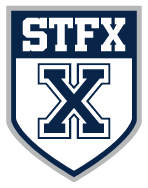Open letters from Indigenous student-athletes Julia Baniak and Colin Buffalo
On this national day of Truth and Reconciliation, STFX Athletics shares open letters from Indigenous student-athletes Julia Baniak of the X-Women Rugby team and Colin Buffalo of the X-Men Football team.
JULIA BANIAK
My Name is Julia Baniak. I am a 19-year-old Cree (Nêhiyāw) woman from St Albert, Alberta. My home reserve is Muskeg Lake Cree Nation in Saskatchewan. I am the granddaughter of a Residential School Survivor. At a Ceremony for Truth and Reconciliation Day, I was initially supposed to present a speech with four other students on what reconciliation means to me. However, due to whatever circumstances, the ceremony was canceled. I am grateful that I can still share it with you.
I am the product of intergenerational trauma. I am the product of residential schools. I am the product of colonization, and I am proud of that. I can not speak to the horrors our ancestors felt and dealt with in those schools, but I can say I live with the consequences of them every day on my journey. What our people endured and continue to endure today is no fairy tale and can not be sugar-coated. We did not have any heroes to save us, and we still don't. Every day we fight to get recognized and heard. We are our own heroes. Now, if the mere introduction of my speech makes you uncomfortable to listen, think, or even speak about... imagine our lives daily. Conversely, if you weren't uncomfortable before, it might make you when I get a little personal about my family and my journey, as it is what reconciliation means to me.
My Kokum (grandmother), Rosalie Arcand, was a residential school survivor. Although she would never speak about her experiences, I can tell you it must have been felt in the way she parented. I say it must have been felt by how she parented because she grew up with a lack of parental presence. Nuns and Priests raised her, which means she couldn't learn from her parents how to parent. Although the school might not have given her the knowledge of how to parent, what she did know was how to fear our culture, so she never talked about it. Hence leading my father and two aunts not to know our culture; besides that, I can not speak of their experiences growing up because it is not my own story (it is a tradition not to share other people's stories unless they gave you permission to do so, which is why I can not share them with you.) On the contrary, I can say I deal with the effects every day of not learning about my culture from my dad, who never had the knowledge in the first place. I do not blame him for not trying to learn because we all find trauma in our own ways when we talk about our culture. For me, my trauma is being whitewashed. What I mean by that is not being seen by either race. I do have white ancestors, but I as well have native ancestors. It is a bit simpler in our world because we do not have blood quantum. However, I am still seen as too white because I never grew up on a reserve. As for living in the white world, all they can tell is that I am not white. Most commonly, I get asked if I'm Latina (which I take as a compliment because they're gorgeous); I also have been called middle eastern and Asian, to my surprise. This becomes traumatizing because I never feel seen by either culture. Even on my journey, I must balance relearning my culture and decolonizing vs. the colonized world I am used to. I admit I am fortunate compared to many and have it easier than others, but the journey to reclaim my heritage is not. That is why I am the product of intergenerational trauma, a residential school, and colonization. My journey and my truth as a mixed indigenous person are my reconciliation. Having said that, everyone must acknowledge that my reconciliation journey differs from the next. We all individually have our journey, but as a community, we stand together to make the world a better place for the next generation of Indigenous Youth.
COLIN BUFFALO


